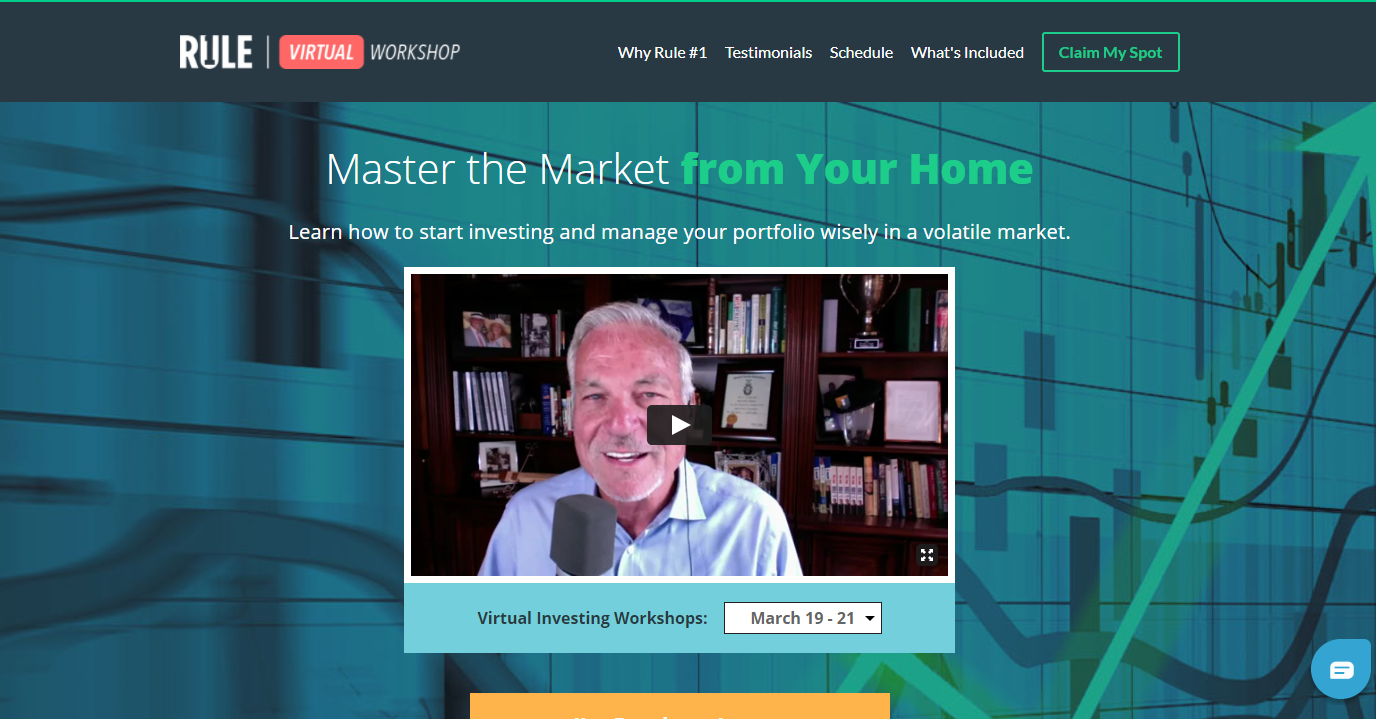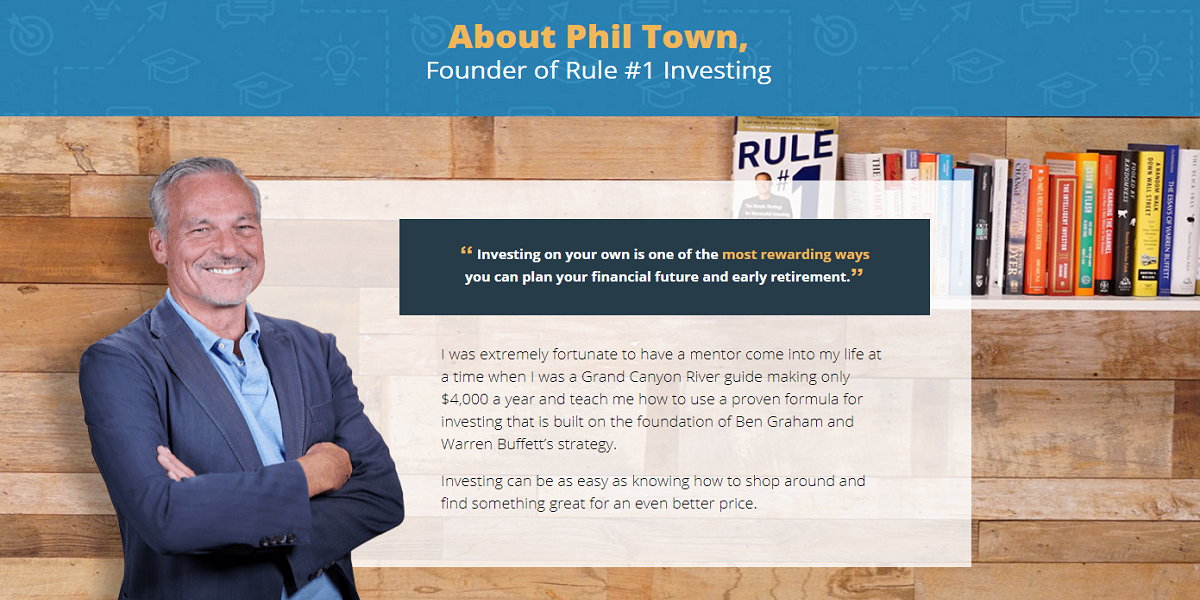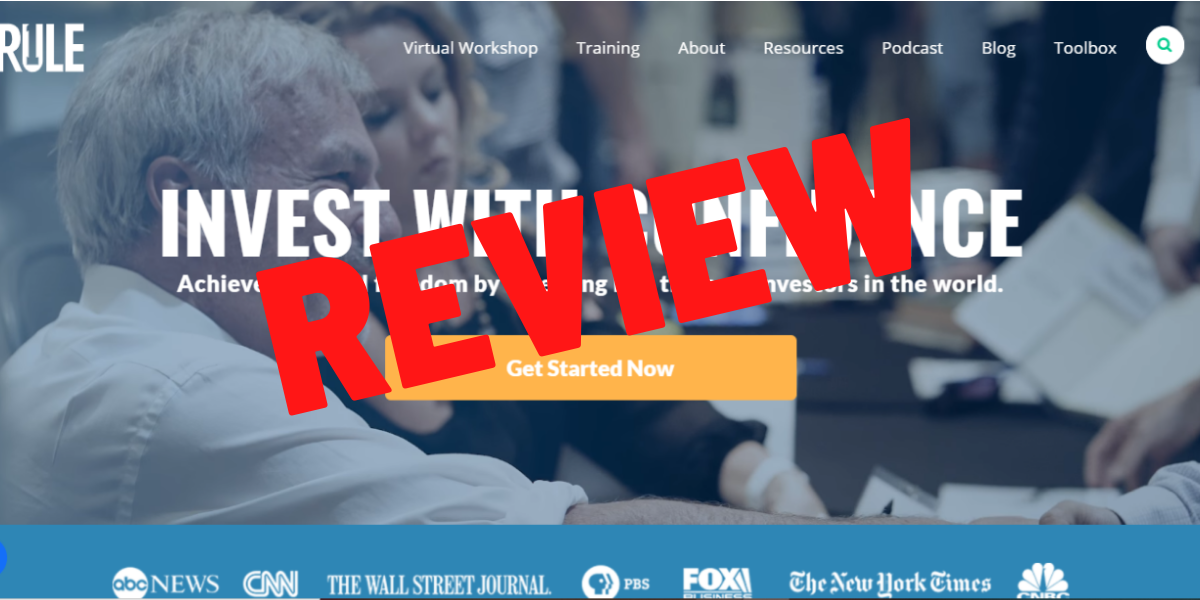Rule One as stated by Phil Town and essentially borrowed from Warren Buffet, is simple; “Never lose money”. Rule Two is merely an emphasis & repetition of Rule One; “Never forget Rule One”. Phil Town is an adherent to the Warren Buffett strategy of ‘buy and hold'.
Phil Town states, “it is my mission to empower individual investors to take control of their money and transform their lives the Rule #1 way”.
The Rule One Investing marketing material is characterised by numerous offers of ‘free access' to webinars, seminars, blogs and podcast content, etc. The adage “there's no such thing as a free lunch,” holds true for the investment and trading space as much as it does for most aspects of life. These ‘free to access' training and information sources appear to function in large part as contact harvesting tools. Many of the attendees of the ‘free' weekend seminars report having experienced pressured on-selling of the Rule One Investing products.
This review sets out to objectively and authoritatively review and ascertain if Rule One Investing delivers on its claims to be a source of leading investment advice and training or whether it is little more than a much hyped scam.
The Teaser
“Rule One Investing is a simple guide to returns of 15 percent or more in the stock market, with almost no risk,” this is a direct quote from the Phil Town's Rule One Investing Facebook page. The additional bold assertion is made, “Rule #1 investing is practically immune to the ups and downs of the stock market.”
Another extravagant and oft repeated claim made by this and many other similar offerings, is that the course will equip the subscriber with the ability to invest profitably while only applying themselves to the task for an unrealistically brief period, in this case a claimed 15 minutes per week. Our modern lifestyles have most of us living time deficit lives, so the opportunity to free up time to pursue other facets of our lives has significant marketing appeal.
Rule One Investing is intensively marketed on social media, with Phil Town's Facebook marketing being but one example of this.
Phil makes constant direct and indirect reference to the investment strategies and philosophies of Charlie Munger and Warren Buffett. He states, “Investing is about minimising risk to generate wealth over the long term – not generating short-term profits. Plus, you should never really buy businesses with the intention of selling them.” This statement is directly rooted in the Berkshire Hathaway Inc. investment strategy. That Mr. Town has successfully applied this strategy to his personal situation is beyond doubt. There is no evidence of any official endorsement of Rule One Investing by Buffett or Munger (Town makes no such claims), but the unrestrained alignment of the brands by Phil Town is clearly a deliberate and thoroughly crafted marketing ploy.
Table of Contents
What is Rule One Investing?
Who are Rule One Investing / Phil Town?
Is Rule One Investing legit?
What is the track record?
How Rule One Investing works.
What do you get?
The cost and refund policy.
Performance
Pros vs cons
Summary and conclusion
What is Rule One Investing?
Rule One Investing is a subscription based investment and trading advisory service with an offering that also includes comprehensive training and trading guidance for new investors.
One of the most enthusiastically promoted aspects of the Rule One Investing offering are the weekend investment workshops, the catchy promotional slogan is, “One weekend to change your financial future.” There is a cost attached to attending these workshops but most if not all attendees appear to be gifted ‘limited availability' complimentary tickets. There are many published testimonials from attendees stating how beneficial the weekend workshops are, but a constant observation is the intensive upselling conducted by Phil Town's sales team at the seminars.

Who are Rule One Investing / Phil Town?

Born in Portland Oregon in 1948 Phil Town is something of an enigma, vaunted by some in the investing community, he is also dismissed as a ‘slick Willy' or ‘snake oil salesman' by his critics and competitors. Mr Town has cultivated and skilfully maintains a high profile online media presence, his YouTube videos are informative and presented in genial if not charming manner.
The holder of a Bachelor of Arts degree in philosophy from the University of California, San Diego, Phil Town is also the author of three New York Times best-sellers covering the fields of investing and trading. The titles are, Invested, Rule #1 and Payback Time: Making Big Money is the Best Revenge. Phil also regularly produces the free to access, Rule #1 Finance Blog which covers topics like:
- What type of investing training do I need?
- Investing for beginners: Get started investing with these 10 steps.
- 15 Types of investments: What will make you the most money?
- Are robot-advisors a good idea?
- What is a stock split?
- Investment planning 101: How to create an investment plan in five steps.
- How are stock prices determined?
- How to invest money: A simple guide to grow your wealth in 2021.
- How to buy stocks: A beginner's guide to purchasing shares.
- How the stock market works: Stock market basics for beginners and many more topics.
There is a substantial amount of genuinely informative and helpful information that is covered in these blogs. Their role in marketing the Rule One Investing product, although rather obvious, is not overt to the extent that it diminishes the value of the content.
In stark contrast to many personalities associated with competing offerings, Phil Town does not roll out a series of lofty academic credentials or details of an illustrious career within the trading and investment establishment. It could actually be argued that Phil is somewhat anti-establishment as he advances the approach that individual investors can manage their investments as effectively as paid professionals, thereby saving on management fees and commissions.
A onetime Green Beret who saw active service in Vietnam, Phil Town was working as a Grand Canyon river guide earning $4000 a year when he met his trading mentor. A chance encounter in 1980 while river guiding the trustees of the Outward Bound Program and Phil's heroic role in averting a near drowning disaster for the group, was the apparent genesis of his much improved financial fortunes.
Phil Town's version of events recounts one of the trustees (who Phil interestingly but not very originally refers to as “Wolf”) saying to him, “why live like this, when you could be rich?” This trustee mentored Phil's early progression in the realm of investing and lent him the first $1000 of seed funding. True though the account may be, it is a well crafted story illustrating the possibility for a seemingly ‘ordinary' person to succeed as investor and trader.
Phil Town is an engaging orator and he quotes an impressive list of luminaries that he has apparently shared the platform with on speaking tours. The list features, former Presidents Gerald Ford, Jimmy Carter, Bill Clinton and George Bush. Other notable co-speakers include Prime Ministers Margaret Thatcher, Benjamin Netanyahu and former Soviet leader Mikail Gorbachev.
Phil has in recent times teamed up with his daughter Danielle to evolve and expand the reach of Rule One Investing. One of the new features emanating from their collaboration is the creation of the InvestED podcast with more than 300 episodes, which it is claimed have been downloaded millions of times.
Danielle Town holds a law degree from New York University and she has authored a book, “Invested: How I Learned to Master my Fears and my Money to Achieve Financial Freedom and Live a More Authentic Life.”
Being no shrinking violet Phil Town claims to have turned the initial $1000 loan from his trading and investing mentor into more than $ one million over a five year period. There is ample evidence of Town's wealth although the attributable source is not without question. The portion of his wealth accumulation attributable to his investment success as opposed to the sales of the Rule One Investing offering is not disclosed.
Is Rule One Investing Legit?
If a prominent public profile is a reliable indicator of a company's legitimacy, and this is not always a safe assumption, then there would be little doubt as to the legitimacy of Rule One Investing.
Phil Town has been endorsed by some fairly high profile personalities in the trading and investments community:
- Arthur Levitt – Former chairman of the SEC, is quoted as saying, “Follow Town's simple, time-tested precepts, and even unsophisticated investors will leave most mutual fund managers in the dust.”
- James Cramer – Host of CNBC's Mad Money.
- Rich Karlgaard – Publisher of Forbes.
- Gene Marcial – The Wall Street Insider.
As is often the case with similar offerings, there are many published but unverified testimonials from supposedly satisfied subscribers. This begs the question as to why no attempts are made to submit the supposedly authentic testimonials to credible reviews by the likes of Trustpilot.
The Rule One Investing Facebook reviews are a case in point with several credibility red flags being raised. Many reviews from supposedly different people are written with similar or slightly modified word composition. This may be the result of outsourcing the Facebook marketing campaign to a less than competent and unscrupulous service provider. At worst it is an unsophisticated and disappointing attempt at subterfuge. Whatever the facts behind the anomalies with the Facebook marketing are, it is mindboggling that such poorly presented reviews are offered as proof of subscriber satisfaction.
What is the Track Record
Unlike many competing offerings, Rule One Investing does not list an archive of referable past performance. Evidence of a positive track-record is largely anecdotal and based on Phil Town's public claims. This lack of demonstrated and documented proof of the success of Rule One Investing is a difficult to ignore shortcoming. The dearth of verifiable successful examples is a significant shortcoming. A favourable counter to the aforementioned lack is the fact that the underlying concepts of Rule One Investing are largely analogous to the Berkshire Hathaway Inc. approach. This manifests as a proven and risk averse approach to trading and investing.
How Rule One Investing Works
The vast majority of individual traders, estimates vary between 85% and 90%, lose money. Phil Town is upfront with this statistic and offers what he terms a simple approach to being part of the successful minority of traders and investors. Rule One Investing propagates a low-risk approach to trading and investing. A great deal of emphasis is placed on thorough pre-investment research.
Phil Town applies and updates many of the concepts postulated in 1949 by Benjamin Graham to his trading approach. Frequent reference is also made to trading luminaries like the celebrated Warren Buffet and Charlie Munger. One of the more controversial aspects of Phil Town's espoused investment approach is that you only have to dedicate 15 minutes per week to the Rule One Investing strategy. This claim has been roundly dismissed, even by many of those who adhere to other aspects of the Rule One approach. These claims of minimal required time commitment are made by the likes of Andrew Keen's Project 303 too as well as several other offerings. These claims, lacking as they are in credibility, are probably intended to address the fact that most of us lead time impoverished lives. The promise of alleviated time demands is a popular marketing strategy across many products promoting income generation.
Phil Town's 4M's are offered as his original template to apply as part of the approach to take when evaluating an investment opportunity and are outlined as follows:
- Moat – According to Town this relates to the competitive advantages a company has over its sector competitors. The advantage may relate to, brand loyalty, patented technology / services, price dominance and generic association with a particular product, e.g. Kellogs and breakfast cereals.
- Meaning – This suggests that one should hold a passionate interest in the companies and products we choose to invest in. His example of loving aircraft and investing in airlines is perhaps not the best chosen example. As avid aviation enthusiast and someone with operational knowledge of the sector, one would know that the sector is very competitive with very tight operational profit margins. Even the super-investors like Warren Buffet have disinvested in the sector, it must be acknowledged that the airline business has been severely impacted by the Covid 19 pandemic restrictions. While Phil's use of the airline industry example is in the main used to illustrate passion directed investments, the added illustration is that passion must be tempered with an awareness of sometimes rapidly changing market forces and economic realities. This observation serves to illustrate that one should be objective and diligent when arriving at investment decisions and that investment advice should never be taken as infallible. The increasingly popular concept of ethical or conscientious investing in fields like renewable or green energy would also be included under this heading.
- Management – Town's belief that you should have trust and confidence in the capability of the management of a company that you are considering investing in, is a well reasoned approach. In our current information era it is not too difficult to conduct fairly thorough background research and due diligence on a company's management.
- Margin of Safety – One of Phil Town's most emphasised strategic approaches is to buy into good companies at a discounted price, to quote Rule One Investing, “you should always be searching for a dollar bill that is retailing at fifty cents.” This approach of buying undervalued shares is a key aspect of the Berkshire Hathaway Inc. approach to investing and is the basis of sound implementation of a low risk investing approach. Market crashes often present opportunities to purchase shares in grossly undervalued companies.
A variable that Phil Town and many other economic commentators are factoring into the near term trading environment is that of a widely predicted approaching recession. The U.S. Federal Reserve's prolific printing of and paying out of currency as part of a Covid pandemic relief program has many economists, prominent traders and investors predicting a financial environment characterised by hyper-inflation as a consequence of a drastically devalued U.S. dollar. To this end Phil dedicates a considerable amount of effort on outlining strategies to effectively and profitably trade the markets in a recession.
What do You Get?
On enrolling for a Rule One Investing workshop the subscriber gets access to the following training course material.
- How to find and select companies that you believe are great companies and that have meaning to you.
- How to determine the value of the companies that you want to invest in.
- The methodology behind creating a market-crash-proof portfolio.
- How to correctly copy and select suitable investors to copy.
In addition to the workshop training material, the subscribers get (as is almost always the case with similar offerings) several bonuses valued at a supposed total of $3000+, the bonus list comprises.
- Three days of in-depth investment education.
- Access to a group chat with your c0-investors and a live coach.
- Three months of access to Phil's Rule #1 Toolbox software which enables the analysis of stocks and compiling of watch lists.
- A trial of the TD Ameritrade's Think or Swim software platform. This software facilitates trading from your computer and interaction with fellow traders using the platform.
The Cost and Refund Policy
There appear to be several offerings from Rule One Investing and the pricing of these products appears to vary from $297 to free access. The weekend seminars appear to have been replaced by virtual workshops due to the Covid Pandemic restrictions. The terms for the virtual workshops are, “Seat are limited. All sales are final. No refunds or switching of event dates will be permitted.” There is in effect no cancellation or refund available.
Performance
Phil Town has a personal nett worth of approximately $ 20 million, how much of this fortune is attributable to his investment strategy or his public speaking engagements and course sales is open to speculation.
The Rule One Investing interpretation and application of the investment philosophies of Benjamin Graham, Charlie Munger and Warren Buffet is a conservative and low risk approach to investing. On the face of it the advocated approach is fairly simple and logical. The claimed average return on investment of 15% is not sensational or unrealistic if circumstances permit the investor to implement what is a fundamentally sound approach as prescribed by Rule One Investing.
Pros vs Cons
Pros
- Phil Town and his Rule One Investing is, on the face of it, a well established entity offering a conservative but proven approach to investing.
- The training is effective and largely free to access.
- The regular blogs, podcast episodes and YouTube channel are consistently updated and topical in content.
Cons
- The testimonials from satisfied subscribers and the performance claims as outlined in the marketing material, although plausible are not credibly substantiated.
- The intensive marketing on social media with specific reference to the Facebook adverts, displays clear indications of manipulated information. As outlined earlier in this review, several positive comments with similar and in some cases identical content, appear to be recycled and attributed to different contributors. There is no escaping that this is patently dishonest.
- The lack of a subscription cancellation or refund policy.
- Given that Rule #1 is unashamedly based on the Berkshire Hathaway Inc. trading and investing philosophy, the information contained in the Rule One training is in the main freely available at no cost from several other sources.
Summary and Conclusion
The usual caveats of don't trade with funds you can't afford to lose, past performance is not a reliable indicator of future performance, etc, apply to Rule One Investing as much as they do to other similar offerings.
Phil Town adopts and replicates a proven and low risk approach to investing that has performed well for him personally and the likes of Berkshire Hathaway Inc. The approach is fairly simple to implement and Phil's educational and training material should empower even new and inexperienced investors to achieve reasonable results.
It is worth noting again that much of the information contained on the Rule One Investing platform is available at no cost elsewhere.
The approach taken with Rule One Investing is one of the long-term holding of stock positions acquired at discount prices. This approach is a method proven by the likes Munger and Buffet for achieving sizeable gains. Phil Town is not reinventing the wheel with Rule One Investing, on the contrary he is replicating and promoting one of the most conservative and proven investment approaches.
Phil Town in referencing his investing workshops, states, “every attendee should understand that it is not necessary to invest in high load mutual funds, and it's possible for them to learn how to manage their own investments.” There is little to suggest that Phil Town is not genuine in his efforts to help the investing public, for a fee that is. Prospective subscribers have to decide whether the offering is worth the asking price.

